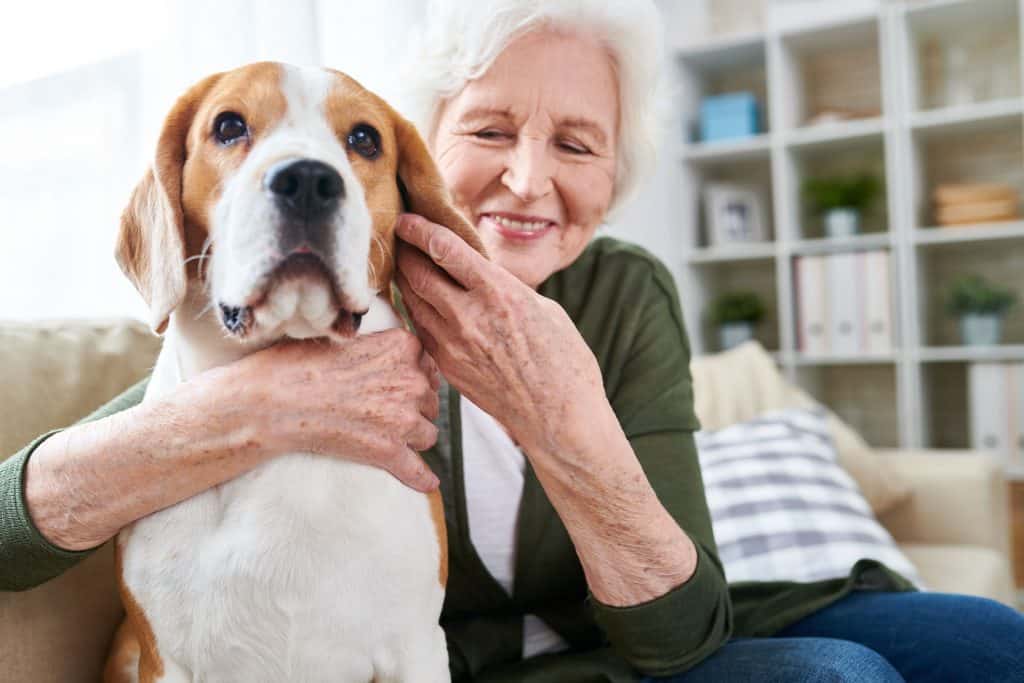Are Beagles Good Service Dogs?

Service dogs are becoming more and more commonly used in society and more and more types of uses for service dogs are being found. They can help with a number of services from work services, emotional-therapy services, and physical disability services.
Are beagles good service dogs?
Beagles are good service dogs in the working and emotional/therapy fields, but not as physical disability services. Beagles are loving and compassionate companions that are great for emotional support. They are also great working dogs used for sniffing out drugs, bombs, and other illegal products.
Beagles may not be the perfect service dog for physical disabilities, but they are great for other important services. I will explain exactly why beagles are, or aren’t, great service dogs for each field below so keep reading to learn more and understand why!
Why are Beagles Great or Not-So-Great Service Dogs?
Beagles are a small breed of dog that are super compassionate, energetic, and great hunters. They are most commonly known as being great family dogs and even sometimes show dogs. They are a compact size with the personality the size of a Great Dane.
Before I go into why the beagle breed of dog is or isn’t great in service sectors, I’ll give you a brief description of what each type of service is for so you may have a greater understanding as to why this breed may or may not be a great candidate.
Work Service
Work service animals can cover a multitude of things. When people think work service, they often think of bomb sniffing dogs or K-9 units in the police force. These stereotypes are true, but they can do much more than just bomb sniffing or assisting police officers in arrests.
These dogs can sniff out all kinds of bombs, different types of drugs, illegal agriculture substances and products all in different law-enforcement fields. These skills can be used in airport security, border control, the police force, or even elite security agencies such as the FBI.
These sniffing jobs don’t necessarily have to be law enforcement, though. These skills could even be used to do something as simple as sniff out bed bugs for businesses and homeowners.
Emotional/Therapy Service
Emotional support animals or therapy animals are becoming a very common thing to see and hear of nowadays. Though some people register their pets as service animals without a
Emotional support or therapy animals are registered to help that suffering from severe mental illnesses such as depression, anxiety, and many other mental disabilities, illnesses, and even phobias.
They are there to comfort their owner with their disability, especially in cases of when they have reactions or
Disability Service
Disability service animals are trained and registered professionally to help those with physical disabilities or chronic illnesses to get through life and also to alert others in case their owner has a problem or accident, especially involving their disability.
These service animals support disabilities such as blindness, deafness, mobility issues, autism, diabetes, multiple sclerosis, epilepsy, cancer, and so much more. These animals do anything from help their owners into a safe place in times of danger, getting help when something happens to their owners, or even simply helping to guide their owner safely.
Beagles as Work Service Animals

Beagles make great work service animals due to their amazing sense of smell. These dogs were once excellent hunting dogs due to their exceptional sense of tracking and smell.
The workforce uses this remarkable ability to track and sniff out different objects or substances that they may be trying to avoid the movement or trafficking of or even detonation of.
Beagles are most often found in airports sniffing out foreign agriculture objects. This can be anything from products to substances to even the bugs and pests that could be on with the plants and produce to prevent the international cross-contamination and infestation of these things or even to prevent the trafficking of illegal substances.
Beagles are most often found in airports for multiple reasons. This breed of dog is a super compact size with the sensory abilities of a large dog. This makes for an easier controlled animal and less space necessary without compromising the quality of the work.
This breed of dog is also much less frightening than the more commonly known breeds of law-enforcement dogs which leaves the passengers more at ease.
Beagles as Emotional/Therapy Support Animals
Beagles also make great emotional support/therapy animals due to their great love, compassion, and loyalty to their owners. These dogs are most often known as family dogs due to their playful, energetic, loving behavior without a mean bone in their body.
It makes for a great dog around kids that can match their energy levels and be a great and loving playmate for the whole family.
This breed of dog is very loving and social which makes it very easy to attach to their owner and easy for their owner to find solace and comfort in this small compassionate creature. They are loyal and 100% willing and able to give all the love and cuddles and attention their owners may need for comfort in times of emotional or mental stress to help relax them again.
Emotional support animals can be a multitude of breeds and types of animals, but a beagle is a great one for quite a few reasons. This breed is a great emotional support animal, especially when traveling, for similar reasons as to why it is a great family dog.
It is a small breed which is easier to take care of and take anywhere. They are super friendly and entertaining, which can be great for distracting their owners before emotional stress kicks in.
These dogs, as I have mentioned are great for this service also because they are so loving. They are completely dedicated to giving their owner the love and affection they need, especially in times they need it.
Beagles as Disability Service Animals
Beagles are not great for being disability service animals for a few reasons. One reason is that disability service dogs often need to be a bigger size in case they need to carry their owner to safety for whatever reason. Beagles are a super small breed that is neither big nor strong enough to carry a human in any way.
Another reason is that these dogs may be a little too easily distracted by social interaction and even random scents they pick up to be able to recognize if their owner is having a physical problem with their disability.
They may have great noses, but they can get too easily distracted to fully pay attention and be fully aware of what is happening with their owner.
Another reason is that beagles are too energetic. Especially with physical disabilities, some of these people cannot walk or anything at a super fast pace that is necessary for keeping up with this super energetic breed.
A dog that has a lower energy and activity level is better for maintaining a good pace that is good for their owner to not stress their disability.
Related Questions:
Do beagles make good family dogs?
Beagles make for great family dogs. They are a very energetic and active breed that can keep up with little children’s energy levels and play habits. They are also a super loving and compassionate breed which will provide all of the love and affection your family will need.
Are beagles a calm breed of dog?
Beagles are not a calm breed. They are actually a highly energetic and social breed of dog that requires a lot of exercise and interaction with others to keep healthy and happy. They are better fit for active people that are very involved in exercising and social interaction to keep up with this dog breed’s needs.
